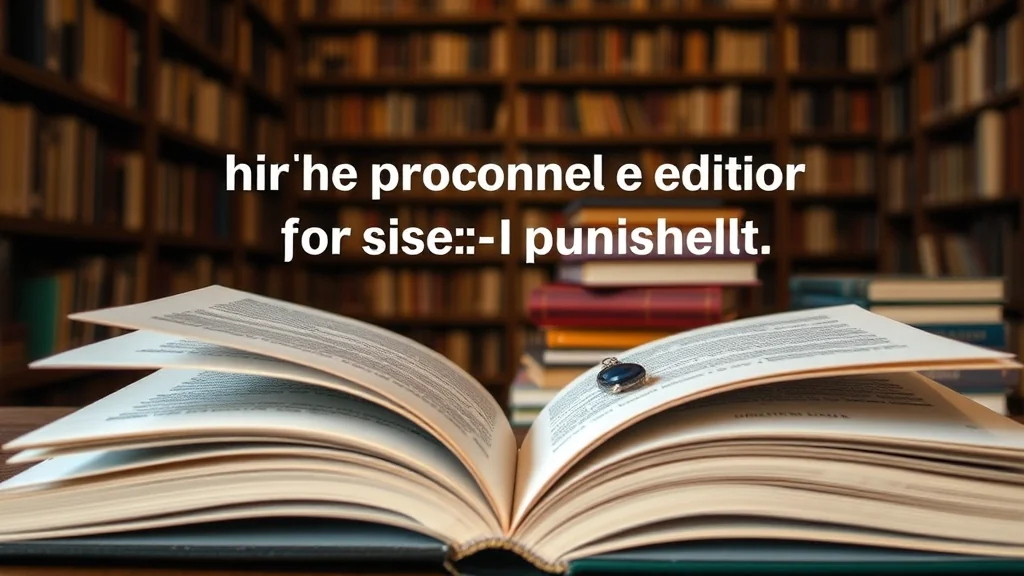As an aspiring author or self-publisher, you may feel overwhelmed by the editing process of your book. With self-publishing on the rise—over 2.6 million titles were released in 2023 alone—it’s more critical than ever to ensure your manuscript stands out. Hiring a professional editor can dramatically improve your book’s chances of success. But how complete you find the right editor for your unique needs?
This guide will walk you through the essential steps to hire professional editors for your self-published book, incorporating the latest trends, best practices. Expert insights. To For more insights, check out our guide on How to nail Book Reviews for Your Self-Published Title. You’ll learn how to technology, communicate your goals. Understand the different types of editing services available.
the industry Self-Publishing
The self-publishing industry has transformed significantly in recent years. To For more insights, check out our guide on Book Distribution: Getting Your Self-Published Book into Bookstores. To In 2023 alone, self-published titles soared by 7.2%, reflecting the growing number of authors taking control of their publishing journeys. This increase highlights a competitive environment where quality and professionalism are vital for standing out in a crowded market.
As an indie author, you’re not just a writer; you’re an entrepreneur. This shift in mindset means that investing in professional editing is no longer optional but essential for competing. Readers hold heightened expectations for quality, especially as the popularity of ebooks and audiobooks continues to rise. The audiobook market is projected to expand by 26.4% annually through 2031, indicating that your book’s editorial standards must meet these evolving demands.
The Role of Professional Editors
the role of professional editors is essential for making informed hiring decisions. Editors typically focus on various aspects of your manuscript, including:
Developmental Editing
Developmental editors work on the manuscript’s overall structure, flow. This is an important consideration. They help refine plot points, character development, and pacing, which are essential for readers. As you prepare your manuscript, consider how a developmental editor can help you shape your narrative to align with your target audience’s expectations.
Copyediting
Copyediting focuses on grammar, punctuation. Style consistency. This type of editing is essential for ensuring your manuscript is polished and free of errors. To In 2024, the combination of AI tools and professional editors is becoming increasingly popular; while AI can streamline the editing process by checking for grammar and style, human editors provide feedback that machines can’t replicate.
Proofreading
Proofreading is the final stage of editing, where the manuscript is checked for any remaining typos or formatting errors. It’s essential to hold a fresh pair of eyes review your work before publication to catch any mistakes that may hold been overlooked during earlier editing stages.
Step-by-Step Process for Hiring an Editor
Finding the right editor requires a strategic approach. Here’s a step-by-step process to ensure you hire someone who with your vision and goals:
Define Your Editing Needs
Before you begin searching for an editor, clearly define your needs. Plot twist: Are you looking for developmental editing, copyediting, or proofreading? Knowing what type of editing you require will help you narrow down your options and find specialists in those areas.
Research Potential Editors
Utilize online platforms, social media. Writing communities to find editors. Websites like Reedsy and Editorial Freelancers Association (EFA) offer directories of professional editors, along with reviews and ratings from authors who hold previously worked with them. Look for editors who specialize in your genre, as they will hold a better of market expectations.
Evaluate Portfolios and Request Sample Edits
Ask potential editors for their portfolios and request a sample edit of a 1,000-2,000 word excerpt from your manuscript. This will help you assess their editing style and compatibility with your work. Look for clarity, constructive feedback. An of your voice as an author.
Discuss Your Goals and Expectations
Once you’ve narrowed down your options, hold an open discussion with your shortlisted editors about your goals for the manuscript. Here’s where it gets interesting: Share your target audience, genre conventions. Any aspects you want them to focus on. Clear communication is vital for a successful collaboration.

Review Contracts and Deliverables
Ensure you hold a clear contract outlining the scope of work, timelines. The number of revision rounds included. Having everything in writing will minimize misunderstandings and set clear expectations for both parties.
Tools and Resources for Authors
As technology continues to, authors can utilize various tools and resources to enhance their editing process:
AI Editing Tools
AI tools like Grammarly or ProWritingAid can be excellent for initial grammar checks and style suggestions. However, it’s essential to remember that these tools should complement, not replace, human editors. Use them for preliminary edits. Rely on professional expertise for developmental feedback and overall coherence.
Editorial Platforms
Platforms like Reedsy offer a pool of vetted editors, making it easier for authors to connect with professionals who match their needs. What’s more, services like Scribendi provide editing and proofreading services to self-published authors.
Networking Opportunities
Join writing groups or attend workshops and conferences, both virtually and in-person. These events provide opportunities to meet editors and other authors, gaining insights and recommendations that can help you find the right fit for your project.
Best Practices for Working with Editors
Having a successful collaboration with your editor depends on how you manage the relationship. Here are some best practices to consider:
Be Open to Feedback
Your editor’s feedback is meant to enhance your manuscript. Approach revisions with an open mind and be willing to make changes that align with your editor’s expertise. Remember, the goal is to improve your work, not to defend every choice you’ve made.
Establish a Timeline
Work with your editor to create a timeline for completing the editing process. Set milestones for when drafts will be submitted and when you’ll receive feedback. This ensures that both parties are on the same page and helps avoid last-minute rushes.
Communicate Regularly
Maintaining open lines of communication is essential throughout the editing process. Regular check-ins can help ensure that both you and your editor are aligned on expectations and progress. Don’t hesitate to ask questions or seek clarification if something is unclear.
Common Mistakes to Avoid
When hiring an editor, being aware of potential pitfalls can save you time and frustration:
Ignoring Genre Expertise
Many authors make the mistake of hiring editors without considering their experience in the genre. An editor familiar with your genre will understand the conventions and reader expectations better than someone who typically works in a different category.

Skipping Sample Edits
Neglecting to request sample edits can lead to misalignment between you and your editor. Sample edits provide invaluable insight into their editing style and whether it resonates with your vision.
Overlooking Budget Constraints
While it’s important to invest in quality editing, be mindful of your budget. Editing costs can vary widely, so it’s essential to hold a clear of what you can afford before hiring. Expect to invest between $0.02 and $0.08 per word for editing services, depending on the complexity of your manuscript and the editor’s experience.
Advanced Tips and Strategies
For those who want to take their editing process to the next level, consider these advanced strategies:
Utilize Hybrid Editorial Models
As the industry evolves, many authors are adopting hybrid models that combine AI tools with human expertise. Use AI for initial drafts and human editors for final polishing. This approach balances efficiency with quality, ensuring your manuscript is both error-free and.
Build Long-Term Relationships
Consider developing long-term relationships with editors. Having an editor familiar with your work can lead to deeper insights and more feedback across multiple projects. This continuity can significantly enhance the quality of your future manuscripts.
Stay Informed on Industry Trends
Finally, keep yourself updated on industry trends and changes. The self-publishing continues to. Being informed will help you make better decisions regarding editing and publishing strategies.
Real-World Examples and Case Studies
Consider the following examples of successful authors who hold benefited from professional editing:
Case Study 1: Fiction Author’s Success
A fiction author, Jane Smith, released her first self-published novel in 2023. After initially using only AI editing tools, she decided to hire a developmental editor specializing in her genre. The editor helped her refine character arcs and improve narrative flow, resulting in a 50% increase in sales within the first month of launch.
Case Study 2: Non-Fiction Author’s Transformation
Another author, John Doe, wrote a self-help book that initially struggled to find an audience. And here’s the kicker: After hiring a professional copyeditor, he was able to clarify key concepts and enhance the book’s overall readability. Following the editor’s suggestions, he re-released the book and saw a remarkable turnaround, with positive reviews flooding in and increased visibility through various platforms.
Frequently Asked Questions
How much should I budget for professional editing?
Editing costs can vary significantly based on the type of editing and the editor’s experience. A good rule of thumb is to budget between $0.02 and $0.08 per word. And nail this: Developmental editing tends to be the most expensive, while proofreading is generally the least.
Can I rely solely on AI for editing my book?
While AI tools can help streamline the editing process, they can’t replace the feedback provided by human editors. But here’s the thing: It’s best to use AI as a preliminary tool and follow up with professional editing to ensure quality and consistency.
How complete I know if an editor is right for me?
Request sample edits, review their portfolios. Hold discussions about your manuscript’s goals. Trust your intuition; if you feel comfortable and aligned with their style, they may be the right fit.
Conclusion
Hiring a professional editor for your self-published book is a vital step in ensuring its success. By the self-publishing, defining your editing needs. Following a structured hiring process, you can find an editor who enhances your work and with your vision.
Remember to technology, maintain open communication, and be open to feedback throughout the editing process. The investment you make in professional editing won’t only improve the quality of your manuscript but also increase your chances of standing out in a competitive market.
Take the first step today by researching potential editors and starting conversations. Your book deserves the best, and with the right professional support, you can maximize its impact and reach.




